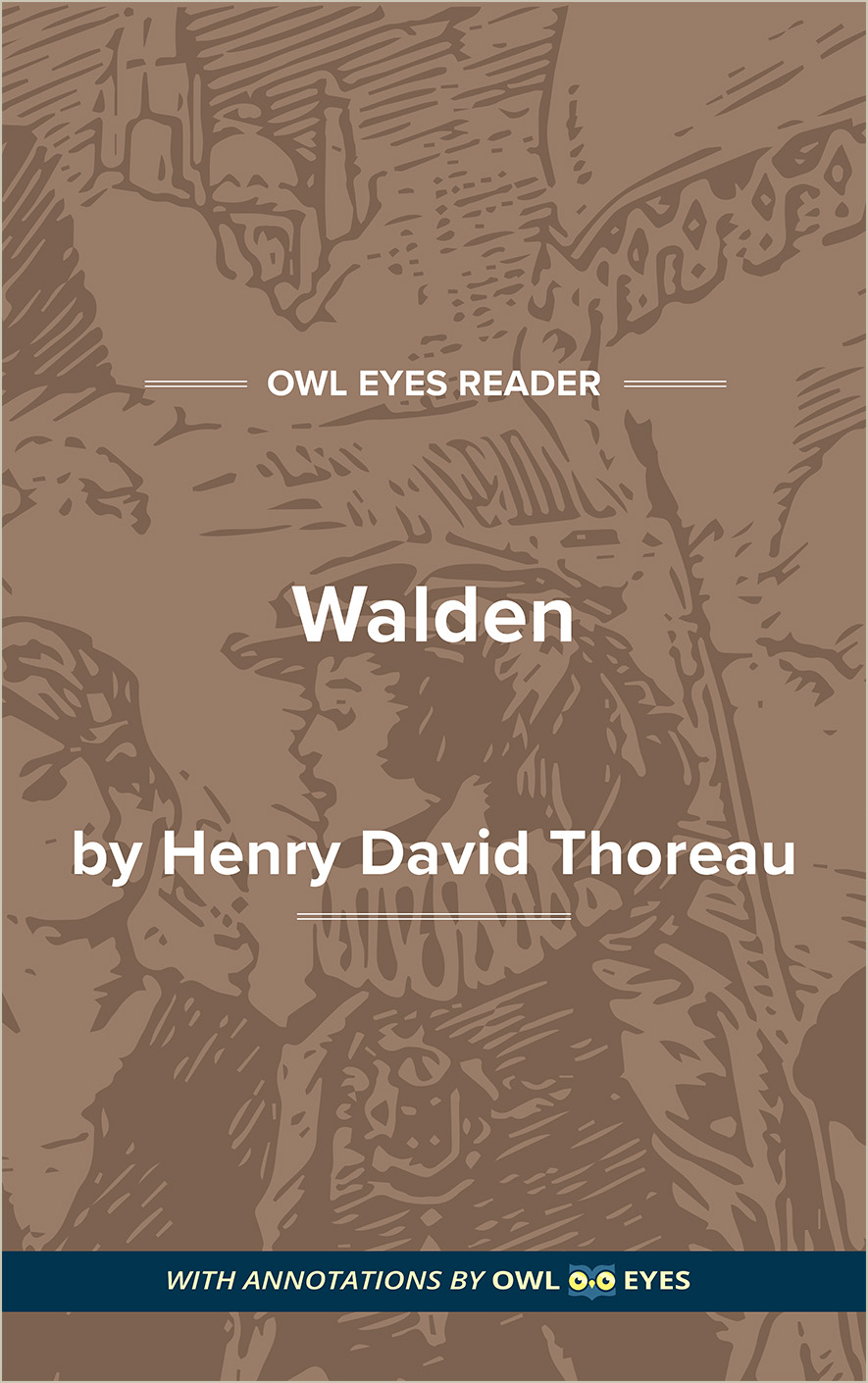Analysis Pages
Facts in Walden
Facts Examples in Walden:
Economy
🔒"the Gulistan, or Flower Garden, of Sheik Sadi of Shiraz..." See in text (Economy)
"Penn..." See in text (Economy)
"Mrs. Fry..." See in text (Economy)
"Newton..." See in text (Economy)
"Milton..." See in text (Economy)
"Cromwell..." See in text (Economy)
"Bacon..." See in text (Economy)
"Jesuits..." See in text (Economy)
"Howard..." See in text (Economy)
"Newfoundland dog..." See in text (Economy)
"Robin Goodfellow..." See in text (Economy)
"for the devil finds employment for the idle..." See in text (Economy)
"Admetus..." See in text (Economy)
"Mucclasse Indians..." See in text (Economy)
"Bartram..." See in text (Economy)
"trig..." See in text (Economy)
"japanned..." See in text (Economy)
"or who own their thirds in mills..." See in text (Economy)
"Marcus Porcius Cato..." See in text (Economy)
"sal-soda..." See in text (Economy)
"hoe-cakes..." See in text (Economy)
"Arcadia..." See in text (Economy)
"Bhagvat-Geeta..." See in text (Economy)
"Arthur Young..." See in text (Economy)
"cords..." See in text (Economy)
"Flying Childers..." See in text (Economy)
"Say..." See in text (Economy)
"Ricardo..." See in text (Economy)
"Adam Smith..." See in text (Economy)
"Minerva..." See in text (Economy)
"Momus..." See in text (Economy)
"purple..." See in text (Economy)
"of course a la mode...." See in text (Economy)
"Cambridge College..." See in text (Economy)
"Trinity Church..." See in text (Economy)
"Broadway..." See in text (Economy)
"mortised or tenoned..." See in text (Economy)
"the Province of New Netherland..." See in text (Economy)
"Sardanapalus..." See in text (Economy)
"Venetian blinds..." See in text (Economy)
"Rumford fire-place..." See in text (Economy)
"Gookin..." See in text (Economy)
"Laplander..." See in text (Economy)
"Samuel Laing..." See in text (Economy)
"Parcae..." See in text (Economy)
"equipage..." See in text (Economy)
"Asiatic Russia..." See in text (Economy)
"Madam Pfeiffer..." See in text (Economy)
"Hanno..." See in text (Economy)
"there is the untold fate of La Prouse..." See in text (Economy)
"the Celestial Empire..." See in text (Economy)
"Liebig..." See in text (Economy)
"Darwin, the naturalist..." See in text (Economy)
"Food, Shelter, Clothing, and Fuel..." See in text (Economy)
"Confucius..." See in text (Economy)
"be not afflicted, my child, for who shall assign to thee what thou hast left undone?..." See in text (Economy)
"Hippocrates..." See in text (Economy)
"Evelyn..." See in text (Economy)
"Wilberforce..." See in text (Economy)
"Raleigh..." See in text (Economy)
"Deucalion and Pyrrha..." See in text (Economy)
"old book..." See in text (Economy)
"Bramins..." See in text (Economy)
"Sandwich Islanders..." See in text (Economy)
Where I Lived, and What I Lived For
🔒"Nilometer..." See in text (Where I Lived, and What I Lived For)
"Brahme..." See in text (Where I Lived, and What I Lived For)
"Saint Vitus' dance..." See in text (Where I Lived, and What I Lived For)
"and talk through a telegraph..." See in text (Where I Lived, and What I Lived For)
"dead reckoning..." See in text (Where I Lived, and What I Lived For)
""glorify God and enjoy him forever."..." See in text (Where I Lived, and What I Lived For)
"the steppes of Tartary..." See in text (Where I Lived, and What I Lived For)
"Cassiopeia's Chair..." See in text (Where I Lived, and What I Lived For)
"Concord Battle Ground..." See in text (Where I Lived, and What I Lived For)
"German Confederacy..." See in text (Where I Lived, and What I Lived For)
"Vedas..." See in text (Where I Lived, and What I Lived For)
"Aldebaran..." See in text (Where I Lived, and What I Lived For)
"Hyades..." See in text (Where I Lived, and What I Lived For)
"Pleiades..." See in text (Where I Lived, and What I Lived For)
"Damodara..." See in text (Where I Lived, and What I Lived For)
"field sparrow..." See in text (Where I Lived, and What I Lived For)
"whip-poor-will..." See in text (Where I Lived, and What I Lived For)
"scarlet tanager..." See in text (Where I Lived, and What I Lived For)
"veery..." See in text (Where I Lived, and What I Lived For)
"wood thrush..." See in text (Where I Lived, and What I Lived For)
"Harivansa..." See in text (Where I Lived, and What I Lived For)
"Cultivator..." See in text (Where I Lived, and What I Lived For)
"Old Cato, whose "De Re Rustica"..." See in text (Where I Lived, and What I Lived For)
""I am monarch of all I survey,..." See in text (Where I Lived, and What I Lived For)
The Village
🔒"caryatides..." See in text (The Village)
"Etesian..." See in text (The Village)
The Ponds
🔒"the diamond of Kohinoor...." See in text (The Ponds)
"the Icarian Sea..." See in text (The Ponds)
"the Ganges..." See in text (The Ponds)
"lampreys..." See in text (The Ponds)
"bulrush..." See in text (The Ponds)
Higher Laws
🔒"Hindoo commentator..." See in text (Higher Laws)
"I find it in Kirby and Spence..." See in text (Higher Laws)
Conclusion
🔒"Mameluke bey..." See in text (Conclusion)
"Croesus..." See in text (Conclusion)
"and lo! creation widens to our view...." See in text (Conclusion)
"frankincense..." See in text (Conclusion)
"Mirabeau..." See in text (Conclusion)
"the Sphinx..." See in text (Conclusion)
"Gold Coast and Slave Coast..." See in text (Conclusion)
""Symmes' Hole"..." See in text (Conclusion)
"isthmus..." See in text (Conclusion)
"South-Sea Exploring Expedition..." See in text (Conclusion)
"Frobisher..." See in text (Conclusion)
"the source of the Nile, or the Niger, or the Mississippi, or a Northwest Passage..." See in text (Conclusion)
"Lewis and Clark..." See in text (Conclusion)
"Mungo Park..." See in text (Conclusion)
"Mr. Grinnell..." See in text (Conclusion)
"Franklin..." See in text (Conclusion)
"oakum..." See in text (Conclusion)
"Tierra del Fuego..." See in text (Conclusion)
"Yellowstone..." See in text (Conclusion)
"buckeye..." See in text (Conclusion)

